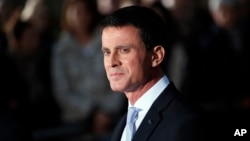Two more French Socialist politicians prepared to join a jostling field for the party's presidential nomination on Thursday though polls showed Manuel Valls, who quit as premier launch his campaign, to be holding a solid lead.
The badly-divided Socialists, more adrift than ever since President Francois Hollande announced on December 1 that he would not run for a second term, are seeking to settle on a candidate who can stop humiliation by a right-wing candidate next spring.
But they are divided among themselves since Hollande alienated many in the party with his pro-business U-turn in mid-term, and polls still indicate little chance of any Socialist candidate preventing a run-off next May between
conservative Francois Fillon and the far-right leader Marine Le Pen.
Despite being seen by many in the party as having betrayed Socialist ideals by his pursuit of pro-business legislation while in office, Valls remains the pollsters' favorite to win the nomination in the party's primaries in January.
A new poll by Harris Interactive published on Thursday had 45 percent of those who say they will definitely vote in the Socialists' primaries as intending to vote for the 54-year-old, Spanish-born Valls.
That put him ahead of his strongest rival in the primaries, Arnaud Montebourg, a leftist firebrand and former economy minister under Hollande, who was on 28 percent.
Other candidates in an increasingly crowded field included Benoit Hamon, also well on the left of the party, while two others, Vincent Peillon, a former education minister, and Health Minister Marisol Touraine were said to be readying to throw their hats into the ring.
About 10 left-wing politicians are expected to put themselves forward for the two-stage Socialist primary though this number will be winnowed down in the New Year when serious campaigning begins and Valls, for one, outlines his program.
A separate poll published on Wednesday found that one out of two leftist voters would cast their ballots for Valls in the first round of the presidential election next April.
Valls was an interior minister who pursued a tough law-and-order agenda before being brought in as prime minister by Hollande's pro-business enforcer — something which irked many on the left.
He is also suspected by some in the party of disloyalty towards Hollande by pressing him to bow out of a second term.
Many commentators say they expect Valls to now "put some water in his wine" and soften his program to win over his critics on the left - and make inroads into France's yawning center ground.
"In politics, you only progress by compromise," Francois Rebsamen, a Hollande confidante, told RTL.
Opinion polls still see Fillon, a former conservative prime minister who has pledged to slash public spending and axe half a million public sector jobs, as winning the presidency next year with two-thirds of the vote against a third for Le Pen.
The task of whoever emerges at the end of January as the left's standard-bearer will be to try to seize ground particularly from Le Pen's blue-collar voters and make it, against the odds, into a runoff with Fillon.
But even then any Socialist candidate also faces strong opposition from two "mavericks" — veteran left-winger Jean-Luc Melenchon and Emmanuel Macron, a former economy minister under Hollande - who are not taking part in the primary. Both are powerful figures who can draw voters away from the Socialist base.





